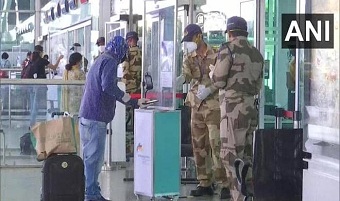The Airports Authority of India (AAI) has decided to procure 198 body scanners for 63 Indian airports that will replace the existing door frame metal detectors and hand-held scanners, and discontinue pat-down searches of passengers to detect metallic objects, officials said. “The process for procurement of body scanners started earlier this year before the COVID-19 pandemic. It has become important to get these scanners as soon as possible as frisking of passengers by security personnel has already been minimised since March due to the pandemic,” the AAI officials noted.
Out of these 198 scanners, 19 will be for the Chennai airport, 17 for the Kolkata airport and 12 for the Pune airport, the officials said. “Seven body scanners will be deployed at the Srinagar airport, six at the Visakhapatnam airport, and five each at airports in Tirupati, Bagdogra, Bhubaneswar, Goa and Imphal,” they added. Four body scanners each will be put at airports in Amritsar, Varanasi, Calicut, Coimbatore, Trichy, Gaya, Aurangabad and Bhopal, the officials mentioned.
They said the tender to procure 198 body scanners for 63 airports has been issued and three companies have put in their bids. “These three companies have put in their technical bids. If they pass our technical criteria, we will ask them to submit financial bids. An award of contract will then be given to one of them,” the officials stated. Passengers have to remove their jackets, thick clothing, shoes, belts as well as all metallic items before entering into the body scanner of an airport. A mannequin-like image is generated by the machine, and if there is a yellow spot on the screen, it means that area on the body may need further screening. Once the body scanners are installed at an airport, pat-down searches will not be required for passengers, the officials said.
The Central Industrial Security Force (CISF) on March 19 had stated, “CISF personnel deployed at 63 domestic and international airports have been sensitised to adopt ‘minimum touch’ concept and also wear masks, surgical gloves and not to touch any item or article of the passenger during pre-embarkation screening.” Staffers at these airports have also been advised to interact with passengers from a distance without compromising security procedures, the CISF said.








